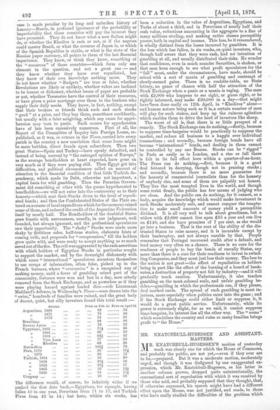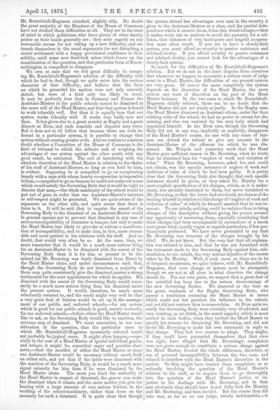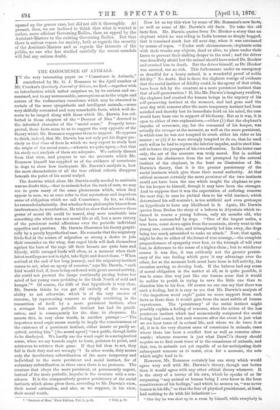MR. KNATCHBULL-HUGESSEN AND ASSISTANT- MASTERS.
MR. motion of yesterday week was clearly one for which the House of Commons, and probably the public, are not yet,—even if they ever are to be,—prepared. But it was a moderate motion, moderately urged, and though it was disfigured by one exaggerated ex- pression, which Mr. Knatchbull-Hugessen, as his letter in another column proves, dropped quite unintentionally, the conventional sort of reprobation with which it was received by those who said, and probably supposed that they thought, that, if otherwise expressed, his speech might have had a different effect upon the House, was not justified, and reads, to those who have really studied the difficulties of the problem which Mr. Knatchbull-Hugessen attacked, slightly silly. No doubt the great majority of the Members of the House of Commons have not studied those difficulties at all. They are in the state of mind in which politicians who have plenty of other knotty points on their hands generally are ; they seize eagerly on any reasonable excuse for not taking up a new difficulty, and en- trench themselves in the usual arguments for not disturbing a recent settlement with a happy provisional confidence in their solidity, until some new dead-lock arises which forces on the consideration of the question, and that particular form of Kno w- nothingism is compelled to disappear.
We own at once that we feel great difficulty in accept- ing Mr. Knatchbull-Hugessen's solution of the difficulty with which he had to deal, though we quite enter into the serious character of that difficulty, and believe that the facts on which he grounded his motion were not only correctly stated, but were of a kind only too likely to recur. It may be perfectly true that in Germany and France the Assistant-Masters in the public schools cannot be dismissed at the mere will of the Head Master, and that that system is found to work tolerably well. But then it is equally true that our system works tolerally well. It works very badly now and then. It has given rise to a great scandal at Rugby and a great dispute at Eton, and such scandals and disputes may recur. But it does not at all follow that because there are evils in- herent in a particular system, it is possible to change that system without causing greater evils. And we confess to a serious doubt whether a Committee of the House of Commons is the kind of tribunal to which the delicate task of weighing the advantages of one system against the other could, with any good result, be entrusted. The evil of interfering with the absolute discretion of the Head Master in relation to the choice of his staff of Assistant-Masters, so long as you hold by him, is evident. Supposing he is compelled to go on co-operating lamely with a man with whom hearty co-operation is impossible to him,—compelled to go on because he could not make out a case which would satisfy the Governing Body that it would be right to dismiss that man,—the whole machinery of the school would be put out of gear, in order that one Assistant-Master's interests or self-respect might be protected. We are quite aware of the argument on the other side, and quite aware that there is force in it. It will be said that to require the assent of the Governing Body to the dismissal of an Assistant-Master would in general operate not to prevent that dismissal in any case of serious incompatibility of character or temper, but only to make the Head Master less likely to provoke so serious a manifesta- tion of incompatibility, and to make him, in fact, more reason- able and more patient in his relations with his Staff. And no doubt, that would very often be so. At the same time, we must remember that it would be a much more serious thing for an Assistant-Master to be dismissed with the assent of the Governing Body than it is for him at present to be dis- missed (as Mr. Browning was lately dismissed from Eton) by the Head Master alone, and under circumstances such that, though the Governing Body do not interfere, a majority of them may quite consistently give the dismissed a strong testimonial for the next appointment for which he applies. His dismissal with the assent of the Governing Body would neces- sarily be a much more serious thing than his dismissal under the present system. It would, therefore, be much more reluctantly resorted to, and the result might very well be that a very great deal of friction would be set up in the manage- ment of our public and endowed schools,—for any system which is good for our public schools is good, mutatis mutandis, for our endowed schools,—before either the Head Master would like to ask, or the Governing Body would like to sanction, the extreme step of dismissal. We must remember, in our con- sideration of the question, that the particular cases to which Mr. Knatchbull-Hugessen necessarily referred would not probably be,, ypical cases. It might often happen,—espe- cially in the case of a Head Master of special individual genius, and unique, it might be, somewhat eager and peculiar char- acter,—that the sacrifice of either the Head Master or some one Assistant-Master would be necessary without much fault on either side, and yet that if the latter were dismissed with the sanction of the Governing Body, it would be a much more signal calamity for him than if he were dismissed by the Head Master alone. The more you limit the authority of the Head Master in respect of dismissal, the graver you make the dismissal when it comes, and the more motive you give for bearing with a large amount of very serious friction in the working of the school-machinery, rather than force on the necessity for such a dismissal. It is quite clear that though the system abroad has advantages over ours in the security it gives to the Assistant-Masters as a class, and the partial inde- pendence which it assures them, it has this disadvantage,—that it makes every one so anxious to avoid the necessity for a col- lision, that instances of very inadequate and languid co-opera- tion must often result. If you are to have a closely-knit system, you must afford no security to passive resistance and subdued rivalry. If you afford security to passive resistance and subdued rivalry, you cannot look for the advantages of a closely-knit system..
So much for the difficulties of Mr. Knatchbull-Hukeseen's solution. But we do not in the least disguise from ourselves that whenever we happen to encounter a serious want of judg- ment in a Head Master, the difficulties of our present system are very great. Of course the more completely the system depends on the discretion of the Head Master, the more serious -any want of discretion on the part of the Head. Master becomes. In the two cases to which Mr. Knatchbull- Hugessen chiefly referred, there can be no doubt that the Head Master did not act wisely or justly. In the Rugby case, the Head Master dismissed an Assistant whom, under the then existing rules of the school, he had no power or excuse for dis- missing, and who was restored by the very body which had appointed himself. In the Eton case, though the Governing Body did not in any way, implicitly or explicitly, disapprove of the Head Master's course, no one with any sense of fair- ness can defend the refusal to give any account to the Assistant-Master of the offences for which he was dis-' missed. Mr. Walpole said yesterday week that the Head Master gave sufficient reason to Mr. Browning, when he wrote that he dismissed him for "neglect of work and violation of rules." What Mr. Browning, however, asked for, and could not obtain, was the specific instances of neglect of work and violation of rules of which he had been guilty. It is pretty clear that the Governing Body also thought that such specific instances should be given, as they asked Dr. Hornby for a more explicit specification of his charges, which, as it is under- stood, was actually furnished to them, but never furnished to Mr. Browning, so that the latter had absolutely no chance of de- fending himself in relation to this charge of "neglect of work and violation of rules," of which he himself asserted that he was in- nocent. To our minds, nothing could be unfairer than to bring charges of this description without giving the person accused any opportunity of answering them, especially considering that these charges had been accompanied by accusations of a much more grave kind, equally vague as regards particulars, if less per-. tinaciously preferred. We have never pretended to say. that Mr. Browning was innocent of the charges brought by his chief. We do not know. But the very fact that all explana- tion was refused to him, and that he was not furnished with the statement made to the Governing Body against him, sub- stantiates, to our minds, the very serious injustice of the course taken by Dr. Hornby. Well, if such cases as these are to be of frequent occurrence, we quite believe, with Mr. Knatchbull- Hugessen, that some change of system must be attempted; though we are not at all clear in what direction the change should be. For our own parts, we suspect that a great deal of the mischief has been due to the serious shortcomings of the new Governing Bodies. We observed at the time on the grave weakness of the Rugby Governing Body, who passed a resolution censuring the Head Master in terms which could not but paralyse his influence in the school, and yet did not venture then to remove him. At Eton quite re- cently the Governing Body were certainly very ill-advised, and very wanting, as we think, in the moral sagacity which is most needed in such bodies, when they invited the Head Master to specify his reasons for dismissing Mr. Browning, and did not invite Mr. Browning to make his own statement in reply to that charge. They had two courses to adopt. They might, if they could have persuaded themselves that that view was right, have alleged that Mr. Browning's complaints were not grave enough to constitute a serious charge against the Head Master, treated the whole difference, therefore, as one of personal incompatibility between the two men, and refused to interfere with the Head Master's discretion in the matter. Cr they might have treated these complaints as so seriously involving the question of the Head Master's relation to his staff, as to require them to go thoroughly into the question of the Head Master's justice or in- justice in his dealings with Mr. Browning, and in that case obviously they should have heard fully both Dr. Hornby and Mr. Browning, and then decided. But the course they did take was, as far as we can judge, utterly indefensible it opened up the graver case, but did not sift it thoroughly. At present, then, we are inclined to think that what is wanted is rather, more efficient Governing Bodies, than an appeal by the Assistant-Masters to the existing Governing Bodies. But that there is serious reason for anxiety, both as regards the security of the Assistant-Masters and as regards the interests of the public, no one who has studied carefully the recent scandals will feel any serious doubt.




































 Previous page
Previous page